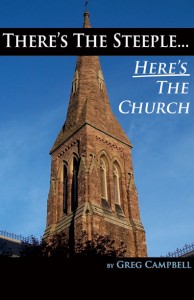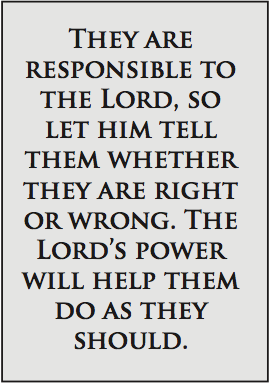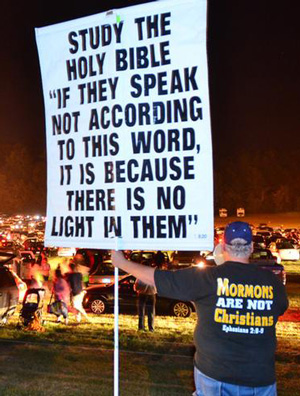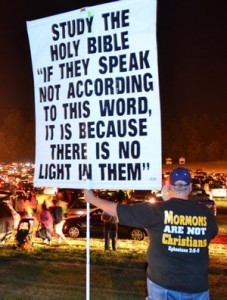 As I mentioned here last week, I published a book on the topic of the Church, titled, There’s The Steeple… Here’s The Church—I call it “The Church Book”.
As I mentioned here last week, I published a book on the topic of the Church, titled, There’s The Steeple… Here’s The Church—I call it “The Church Book”.
As I was recently revisiting this book, I came across a chapter or two that I wanted to share again.
And so that is what I’m doing again here today!
Today’s post is particularly interesting in light of two previous posts this week, Our Experience at the Hill Cumorah Pageant and The Need to Be Right (Can Be So Wrong!).
This is the official book version—the chapter from the book. As such, it’s been edited, partially re-written, and should be a tad more complete than the original posting on the blog in 2005.
If you’d like to get the whole book, please click the Bookstore tab at the top of the page, and you can purchase a copy through Amazon. Thanks!
(Want to read the back cover?)
And now, “Living In Perfect Harmony”
Living In Perfect Harmony
Last night I had a conversation with a friend about some of the choices we have made recently in how we live out our relationship with Jesus. Our close friends know how we have struggled recently with the current (and long-standing) set up of the “church”. How it frustrates us that we have tied our weekly programmed gatherings into the essence of who we are as the church, and things of that nature. This friend disagrees with our conclusions, and just wanted to ask me about some scriptures, in a slightly confrontational way. (Not bad confrontation. No malice was evident, only concern for a friend.)
Well, we went around a few times on a few scriptures, and ideas and practices that some would consider essential, others might not. We definitely had differing conclusions on similar scriptures. Again, we did not throw punches, but there did not appear to be any reconciling of our intellectual differences.
And to my friend, they seemed important. Very important.
So I tried to make a break in the conversation and get us out of the loop of arguing our different vantage points on truth, and try to come to some agreement. Even an agreement to disagree. We agreed to continue the discussion at a later date. That was at least a good step I think.
I still believe that if we argue “truth”, it will only cause relational friction. I have a few friends who are at least skeptics, and on many days they are more like atheists who need to speak their mind to God. (Which is at least a little ironic.) But what I have noticed is that when viewpoints are in such stark opposition, the arguing is mostly just wasting time. No opinion will be swayed by such banter. No “truth” will be settled by an argument. I really believe that nothing can be gained in such a confrontation.
 (Note: That is not to say there is no place for confrontation. If there is a person whom you love who is clearly doing something that will harm them, there is a place for direct and unpleasant confrontation. It most likely will not resolve the issue at that moment, but can certainly lead to better choices down the road. If, as in everything, it is done “in love”. Real love. Not just, “I say this in love” love.)
(Note: That is not to say there is no place for confrontation. If there is a person whom you love who is clearly doing something that will harm them, there is a place for direct and unpleasant confrontation. It most likely will not resolve the issue at that moment, but can certainly lead to better choices down the road. If, as in everything, it is done “in love”. Real love. Not just, “I say this in love” love.)
It has become obvious to me that the only way the give and take can happen in relationships is when differences are 1) accepted and 2) discussed when not in conflict. If there is any hint of “I’m right, you’re wrong” then no relational progress will be made. And again, the emphasis should be on relational progress and not on intellectual, factual “truth” progress. In my opinion.
So after that conversation, I just realized how incredibly different we were. (At least, in the specific area of life we were discussing.) And actually, how badly I had responded. He brought a few things into the conversation that I personally think are silly, void of meaning practices, and, unfortunately, I laughed as he brought them up. I was only thinking of me at that point (I was slightly on the defensive, I suppose, too) and I reacted as though he were not a person capable of being hurt. I hope he was not, but I realized after he left (very much to my chagrin) that I had reacted very unlovingly to some things that he holds to be very important.
As I thought about it more—both my reaction and the issues he raised—I recalled a chapter in the letter Paul wrote to the church in Rome about the very thing we were discussing. And, again, my reactions in that conversation.
I read it today, and I was blown away by the applicable truths I found. I need to quote large chunks of scripture below. Please do read it all, and I will add my comments as we go.
Romans 14:1-4
Accept Christians who are weak in faith, and don’t argue with them about what they think is right or wrong. For instance, one person believes it is all right to eat anything. But another believer who has a sensitive conscience will eat only vegetables. Those who think it is all right to eat anything must not look down on those who won’t. And those who won’t eat certain foods must not condemn those who do, for God has accepted them. Who are you to condemn God’s servants? They are responsible to the Lord, so let him tell them whether they are right or wrong. The Lord’s power will help them do as they should.
Oh wow. I have read this before, and in Bible college, it was a good source of humor to say that, “Vegetarians have weak faith!” That’s obviously not the point, and the comment was made in jest, but funny how even in jest we were criticizing, as Paul is warning us not to do.
Two things. One, don’t argue with them about what they think is right or wrong. And two, to whom do we belong?.
First, as I mentioned to my friend, I really don’t think arguments over what is right or wrong will really go anywhere. God has given us much more freedom than the institution of the church is able to allow for. An institution, by nature, must have some set of guidelines or principals to adhere to that separate it from any other organization, and society at large. Otherwise, it would have no reason to exist. So there is a bit of conformity necessary for its very existence. But that is not so of Jesus’ body. We do not conform to the pattern of this world, but we are transformed by him.
Therein lies the other, deeper truth.
He does it. It’s his body. His church. He knows his servants, and he will lead them. This theme is present through this entire section of Paul’s letter. Who are we to question the practices or beliefs of another brother or sister (that are not specifically against the revealed will of God for all of us) in any matter? Paul says they (we) are “God’s servants.” The owner is not the person in question. Nor can they, nor should they be controlled by other servants. The Owner is Jesus Christ.
Listen to this powerful line again:
They are responsible to the Lord, so let him tell them whether they are right or wrong. The Lord’s power will help them do as they should.
Wow. What if we really lived that way? What if we really trusted God to take care of his own people? They are not responsible to you, or me, or any group of elders, pastors, apostles, or anyone else who cares to wield the authority of a title over them. They are personally responsible to the Lord, so let him tell them whether they are right or wrong. The Lord’s power will help them do as they should.
I say this with such emphasis because I think this piece is so lacking from our corporate life together. Even our individual lives with God. We really don’t believe he’ll do it. We know he can, but in order to be responsible, and keep things going in a good direction, we have to make things happen. We can’t trust God to speak truth into someone’s life. We need to do it. And when the task grows too large, we arrange any sort of structure—rigid or not—to implement that “back-up” plan.
In short, we don’t allow room for Holy Spirit to convict and transform people, we feel like we need to do that. Because he won’t.
Well who do we think we are?
Amazing stuff. Please read on.
Rom 14:5-9
In the same way, some think one day is more holy than another day, while others think every day is alike. Each person should have a personal conviction about this matter. Those who have a special day for worshiping the Lord are trying to honor him. Those who eat all kinds of food do so to honor the Lord, since they give thanks to God before eating. And those who won’t eat everything also want to please the Lord and give thanks to God. For we are not our own masters when we live or when we die. While we live, we live to please the Lord. And when we die, we go to be with the Lord. So in life and in death, we belong to the Lord. Christ died and rose again for this very purpose, so that he might be Lord of those who are alive and of those who have died.
Arguing from the same line of thinking, Paul partially turns his focus from food to a subject that hits much closer to home currently. He says that some Christians have a special day for worshipping. And he does not say this is good or bad. He says it just is. But what we do with that is where the good or bad arises. We should not condemn someone for not holding a certain day sacred, or worshipping on the day we do. Nor should we condemn someone who does have a “special day for worshipping the Lord.” That line obviously hit home, as one thing that irks me about our current structure is the emphasis we place on Sunday. How we even call it both the Sabbath and the first day of the week, which are incompatible terms. (Sabbath was Saturday, while the first day was Sunday, and in our culture, I’d say the first day would be Monday.) But again, the details are not important. Paul says, “Each person should have a personal conviction about this matter.” Whoa! Really? Is that how we live corporate Christian life today? I don’t think so. I think because of the nature of a large institution, we require a bit of conformity, that Paul says here is unhealthy to individuals and to the body.
Romans 14:10-13
So why do you condemn another Christian? Why do you look down on another Christian? Remember, each of us will stand personally before the judgment seat of God. For the Scriptures say,
“ ‘As surely as I live,’ says the Lord,
‘every knee will bow to me
and every tongue will confess allegiance to God.’”Yes, each of us will have to give a personal account to God. So don’t condemn each other anymore. Decide instead to live in such a way that you will not put an obstacle in another Christian’s path.
I just want to point out again that Paul is emphasizing that we are not to call each other to a life according to your own conscience, but to their own conscience. He says we will each give a personal account to God. So, if I do something because you tell me to, even if that doesn’t really match what I am thinking or hearing from God or my understanding of Scripture—if it goes against my conscience—then I will have to answer to God for doing something that I did not think was right.
But at least my helpful Christian brothers and sisters will think I am right. I look like them.
We do not own other people, or have a say in what is right or wrong for them. Nor do they. They answer personally, and directly to their Master and their Father.
Romans 14:14-19
I know and am perfectly sure on the authority of the Lord Jesus that no food, in and of itself, is wrong to eat. But if someone believes it is wrong, then for that person it is wrong. And if another Christian is distressed by what you eat, you are not acting in love if you eat it. Don’t let your eating ruin someone for whom Christ died. Then you will not be condemned for doing something you know is all right.For the Kingdom of God is not a matter of what we eat or drink, but of living a life of goodness and peace and joy in the Holy Spirit. If you serve Christ with this attitude, you will please God. And other people will approve of you, too. So then, let us aim for harmony in the church and try to build each other up.
I think that’s it. I think, as I mentioned at the top, that relationship is the key. Not an intellectual understanding of truth, but neither is it devoid of any absolute truth. It is the truth applied in love and lived out in relationship. As Paul says, aiming for harmony as we build each other up. I do like how he uses the words “aim” and “try”. He knows we are all flawed. Every one of us. So complete harmony is impossible. But it should be our aim to only speak words of love that build up and encourage harmony among us.
It is interesting to note that Paul actually makes a definitive statement regarding the morality of what we eat or drink. He says he knows for sure from Jesus that everything is OK. And yet, that absolute knowledge of truth can not supersede relationship. The relationship is paramount. Not the intellectual truth.
Also, he reminds us that the Kingdom is not a matter of what we eat or drink—or what days we hold as special, or even what we do on those days, I suppose—he says it is a matter of living a life of goodness, and peace, and joy in the Holy Spirit. Again, the focus is not on a factual truth, but a life of love toward one another directed by Holy Spirit—not requirements or restrictions placed on us by others.
Romans 14:20-23
Don’t tear apart the work of God over what you eat. Remember, there is nothing wrong with these things in themselves. But it is wrong to eat anything if it makes another person stumble. Don’t eat meat or drink wine or do anything else if it might cause another Christian to stumble. You may have the faith to believe that there is nothing wrong with what you are doing, but keep it between yourself and God. Blessed are those who do not condemn themselves by doing something they know is all right. But if people have doubts about whether they should eat something, they shouldn’t eat it. They would be condemned for not acting in faith before God. If you do anything you believe is not right, you are sinning.
I noticed that Paul specifically included drink wine in here. There is a taboo associated with alcohol among some groups of Christians in America these days. I wonder if the same was true in Rome in the first century? Well, Paul’s truth then applies the same today. Jesus says there is nothing inherently wrong with any food or drink, but as he has led each individual, so must they choose. If it’s wrong for you, don’t do it. If it’s wrong for the brothers or sisters you are with, don’t do it. Food or drink—or your own freedom—is not worth the conscience of a fellow believer.
What an interesting chapter. It has given me pause again to consider my reactions to things spoken of, or done by the believers whose lives I come across. God is working in their lives, and who am I to say how they live out their relationship with him is either good or bad?
Please don’t interpret the words in this book that way. That is not my intent. I do not want followers. I don’t want to convince anyone that I am right about anything. This is a place where I get to work out stuff that Father is teaching and working in me, and I hope that by sharing it here, perhaps you may hear something from him as well. But it is certainly not intended to be taken at face value and applied to your life.
I am not your teacher. I am not your master. I am only a fellow servant, who longs to know and follow our Master, and our Friend. He is who I answer to, and so do you. Not anyone else who would presume to take his place. Listen to him, and follow him. Do as your conscience tells you to on matters where he has given us freedom.
Some might balk at that. In fact, I know they would. That, they say, will lead to anarchy. But it won’t. Listen to Paul’s claim one more time:
They are responsible to the Lord, so let him tell them whether they are right or wrong. The Lord’s power will help them do as they should.
We rob each other of so much joy in directly following the Head, our Shepherd, our Master. He can, he does, and he will rightly lead us to Truth. To Him.
I supposed that is my challenge. To me, and to you. Let’s allow each other to live out a life directed personally by Jesus. Let’s use our words to encourage and build up, not to condemn a fellow believer when that is so clearly not our place.
You do not belong to me, nor do I belong to you. Together, we follow Jesus. And none other.
This post is a chapter in the book There’s The Steeple… Here’s The Church by Greg Campbell, available through Amazon.com. If you’d like to purchase the book, please click the book title in the previous sentence. If you’d like a free PDF version, it is available here. Also have some of the audio version available at church.gregshead.net. Thanks for reading, sharing, and feel free to add to the discussion in the comments below, or wherever else you can reach me.

 Somehow, through the centuries and millennia of history, religious folk have gotten the notion that the supreme goal of their spiritual pursuit is to know the right answer—to find and know the Truth. With a capital ‘T’.
Somehow, through the centuries and millennia of history, religious folk have gotten the notion that the supreme goal of their spiritual pursuit is to know the right answer—to find and know the Truth. With a capital ‘T’.




 Not that I have any real force behind this open letter to every person on the planet, but it’s what’s on my heart today. For so long, those who claim to know and live for God have been such a harmful representation of him (myself included) that many people wrongly dismiss their rightful place as a beloved, treasured son or daughter of the Creator of the universe.
Not that I have any real force behind this open letter to every person on the planet, but it’s what’s on my heart today. For so long, those who claim to know and live for God have been such a harmful representation of him (myself included) that many people wrongly dismiss their rightful place as a beloved, treasured son or daughter of the Creator of the universe. Though most people nowadays can conceive of no better poster child for agnosticism (or, at the very least, deism), Jefferson himself may have had a bone to pick with such people.
Though most people nowadays can conceive of no better poster child for agnosticism (or, at the very least, deism), Jefferson himself may have had a bone to pick with such people.